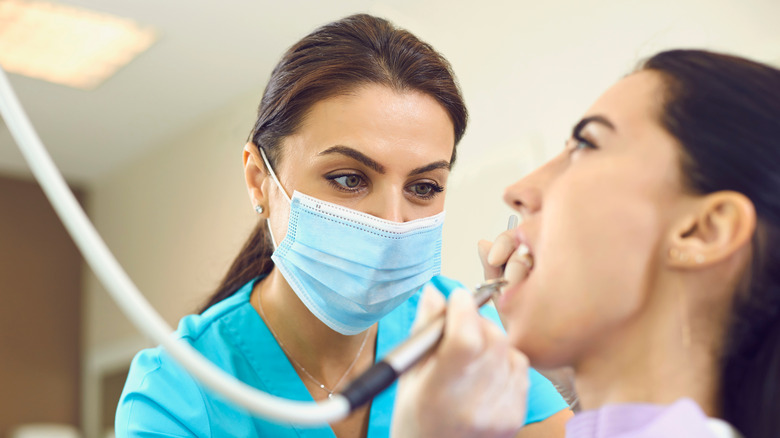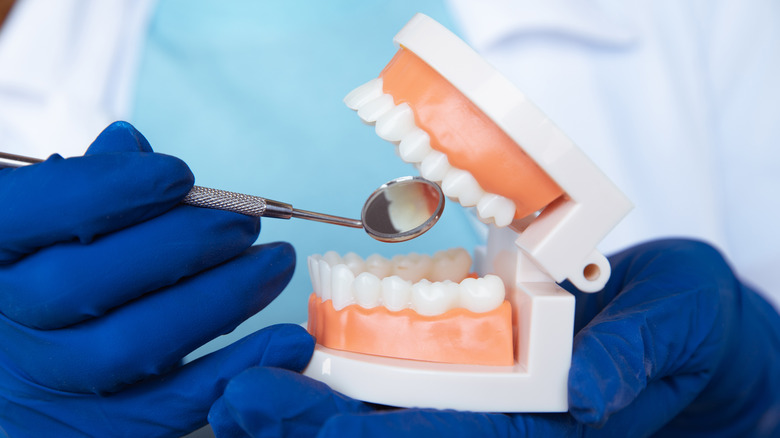How Do You Become A Dental Hygienist?
Millions of patients dread hearing this inevitable question: how often do you floss? According to the National Library of Medicine, a whopping 36% of the population is affected by dental phobia. For 9-20% of people, this means avoiding the dentist all together (via WebMD). Even though movies are no help — Doctor Orin Scrivello from "Little Shop of Horrors" gave dentists a truly bad reputation — it's important to stay up-to-date on bi-annual cleanings, according to Healthline. Dentistry has changed drastically over time, but oral health still has a huge impact on your body's overall well-being. Research has connected it to conditions like diabetes, heart disease, and even strokes (via Mayo Clinic). You may be surprised to learn what really happens when you don't brush your teeth.
Not only do dental hygienists work to assist dentists with oral surgeries, they also perform regular cleanings, conduct X-rays, and administer local anesthetics when necessary, per Concorde. Beginning a career as a dental hygienist also involves strong interpersonal skills, as part of the job requires educating patients on the best oral hygiene practices, according to SJVC. According to Julie Spaans, a dental hygienist based in Michigan, the relationships she builds with her patients are invaluable. As she told Career Colleges, "hygienists really become part of their patient's life." Ultimately, a job in the field can offer flexible part-time options, stable income, and growth opportunities. So how do you become a dental hygienist?
Enroll in an accredited dental hygiene program
The first step, as it is with many new career paths, is to go to school. Entry-level dental hygiene programs are available at community colleges or technical schools, according to How To Become. However, it's important to note whether your chosen program is accredited by Commission on Dental Accreditation (CODA). On average, dental hygiene programs take two years to complete and end in an associate's degree. However, if you aim to pursue teaching or higher-level medical specialization, it's necessary to also receive a Bachelor of Science or a master's degree, according to Online U.
As part of their training, prospective hygienists will study everything from biomedical science to dental software, learning how use tools and manage patients' pain. Like any medical student, members of the program are required to engage in regular, supervised work at dental clinics (via Concorde). Once coursework has been completed at a CODA-certified school, students can apply to take The National Board Dental Examination Part I and II, tests which require fees of up to $150. After passing with a score of at least 75% (congrats!), it's time to apply for your official licensure, a process which will depend on your state's requirements, according to Best Colleges.
Find your ideal workplace
Once your license has been approved, you're ready to start working. According to SJVC via The U.S. Bureau of Labor Statistics, 94% of dental hygienists are employed in dental offices while the remainder pursue careers in public health clinics, nursing homes, or other facilities. As Michigan hygienist Julie Spaans told Career Colleges, "In our particular practice, the dentist is wonderful. He trusts us to do our job and make the right decisions in the hygiene department." Prospective hygienists can search for positions through the ADA CareerCenter.
Since the onset of the COVID-19 Pandemic, some dental offices have faced applicant shortages. According to a 2021 American Dental Association poll, 66.3% of dentists said recruiting dental hygienists had been "extremely challenging" while 19.7% described it as "very challenging." Despite the waning number of prospective hygienists in the wake of our global health crisis, there are definitive benefits to pursuing a career in the field. As reported by the U.S. Bureau of Labor Statistics, the median annual salary for hygienists in 2021 was $77,810, well above the national average. There are also opportunities for part-time work. According to Julie Spaans, "That is one of the main reasons I chose dental hygiene because with a part-time position I can have a career and a family."


